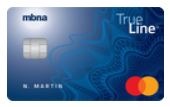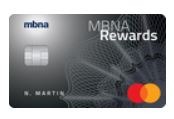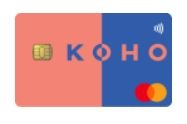Best Credit Cards in Canada for February 2024
If you’re looking for the best credit card in Canada, know that credit cards are not one size fits all. There’s no single credit card that can truly be the best option for everyone simply because we all have different needs.
If you’re a family looking to earn cash back on your high grocery bills or a globetrotter looking to earn rewards and get comprehensive travel insurance, your best cards will differ.
Instead of ranking the top ten credit cards overall, we will provide a list of the best credit cards for different spending scenarios.
The following credit cards were evaluated as the best in their credit card category, and each score reflects a result that was weighted to that category’s criteria and, within that, achieved the highest standing.

Best Travel Credit Cards
American Express Cobalt® Card
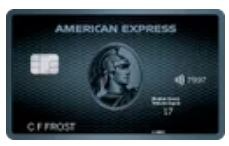
- Welcome Bonus: Up to 15,000 Membership Rewards points
- Annual Fee: $155.88 ($12.99 per month)
- Regular APR: 20.99%
The American Express Cobalt comes with a range of valuable travel insurance and a $100 USD credit for hotels. The Membership Rewards points can be redeemed in four ways, including transferring them to other travel partners at 1:1.
Pros:
- Amex Travel Portal offers 2 points for every dollar spent on travel, gas and transit purchases.
- You can redeem the Amex Membership Reward in multiple ways.
- Book select hotels and receive a $100 USD credit.
- There are 10 different types of travel insurance, including emergency medical coverage up to $5 million.
Cons:
- Relatively high annual fee.
- Amex is still not accepted everywhere, including Loblaws stores and Costco.
Card Details:
As a new Cobalt Cardmember, you can earn 1,250 Membership Rewards® points for each monthly billing period when you spend $750 or more on your Card. You can earn up to 15,000 points in a year, which can be redeemed for up to $150 towards a weekend getaway or concert tickets.
You can earn 5x the points on eligible eats and drinks in Canada, including groceries and food delivery. However, a spending cap applies. Additionally, you can earn 3X the points on eligible streaming subscriptions in Canada, 2X the points on eligible ride shares, transit & gas in Canada, and 1 additional energy on eligible hotel and car rental bookings via American Express Travel Online. For all other purchases, you’ll earn 1X point for every $1 in Card purchases.
You can transfer your points 1:1 to several frequent flyers and other loyalty programs. As a Cobalt Cardmember, you will also receive regular Perks such as bonus reward offers, access to fabulous events, special offers, and events curated for Cardmembers with American Express® Experiences.
Please note that American Express is not responsible for maintaining or monitoring the accuracy of information on this website. For full details and current product information, click the “Apply Now” link. If you apply and get approved for an American Express Card, we may receive compensation from American Express, which can be monetary. APPLY NOW.
CIBC Aventura® Gold Visa Card
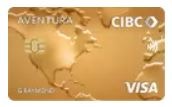
- Welcome Bonus: Up to 35,000 Aventura Points
- Annual Fee: $139 (waived in the first year)
- Regular APR: 20.99%
After accounting for the annual fee, we estimate that CIBC Aventura Gold Visa could earn more than $400 in yearly rewards. This card offers several travel benefits, including free access to airport lounges every year, a rebate of the NEXUS application fees every four years, and five different types of travel insurance.
Pros:
- Decent earn rate on everyday spending
- 4 complimentary airport lounge visits per year
- A NEXUS application fee rebate every four years
- Aventura points cover full airfare, including taxes and fees
- Includes five types of travel insurance
Best Cash Back Credit Card
CIBC Dividend Visa Infinite Card
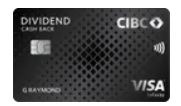
- Welcome Bonus: Up to $200
- Annual Fee: $120 (rebated in the first year)
- Regular APR: 20.99%
This card is the best in Canada for cash back despite the annual fee of $120. This fee is waived for the first year, and you receive a generous welcome offer of up to 10% in cash back on your four first statements (up to $200). This card offers many other benefits, such as travel insurance and consumer protection.
Pros:
- Competitive welcome offer of 10% cash back.
- 4% cash back on gas and groceries.
- Travel insurance.
- Cell phone insurance.
- Visa Infinite benefits.
Cons:
- $120 annual fee.
- High income requirements ($60,000 individual, $100,000 household).
Card Details:
Earn 10% cash back on $2,000 in net purchases over the first 4 statements. The annual fee of $120 is waived for the first year. You can earn 4% cash back on grocery and gas purchases, up to $20,000 in annual gas and grocery purchases or up to $80,000 in net yearly credit card purchases, whichever comes first. Also, you can earn 2% cash back on dining, transportation and recurring bills or payments, up to $20,000 in those purchases or $80,000 in net credit card purchases, whichever comes first.
Additionally, earn 1% cash back on all other purchases with no limit. You can redeem cash back any time, as long as you have made a minimum of $25. You can redeem through CIBC mobile and online banking or on your January statement. Link your card to Journey Rewards to save up to $0.10 per litre at Pioneer, Fas Gas, Ultramar and Chevron gas stations.
Moreover, you can get up to $5 million in out-of-province emergency travel medical insurance for trips up to 10 days when you’re under age 64. You can also get standard carrier accident insurance up to $500,000. The card comes with primary car rental collision/loss damage insurance for a rental car valued at up to $65,000 MSRP (excluding taxes) for 48 days. Additionally, you can get mobile device insurance up to $1,000 (when the device is charged to the card). Purchase security is available up to 90 days from the date of purchase, and extended protection is available up to one year after the product’s original warranty expires.
Finally, you can take advantage of the Visa Infinite program’s perks, including insurance, concierge service, exclusive culinary experiences, and hotel perks such as free Wi-Fi, complimentary breakfast, and late checkout at hotels belonging to the Visa Luxury Hotel Collection. APPLY NOW.
Best Business Credit Card
CIBC Aeroplan Business Visa Card Plus
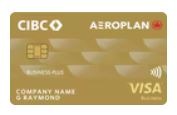
- Welcome Bonus: 60,000 Aeroplan Points
- Annual Fee: $120 (rebated in the first year)
- Regular APR: 19.99%
The CIBC Business Aeroplan Card Plus comes with a $1,200 welcome bonus. This card offers a net annual earning of $456.68 for booking Air Canada and a respectable $430.63 when booking other travel. The card provides various travel benefits, including airport lounge access and free checked luggage.
Pros:
- Welcome Bonus of $1,200 plus 60,000 Aeroplan points
- Air Canada Maple Leaf Lounge: 4 complimentary passes per year
- Employers, employees and up to 8 guests can enjoy a free first-checked bag. Earn Aeroplan Elite Status faster.
- Air Canada Buddy Pass – A companion can get a free base fare ticket wherever Air Canada flies.
Cons:
- $120 annual fee and $50 for each additional cardholder.
Card Details:
Earn up to 60,000 Aeroplan Points in the first year with this credit card. You can earn 10,000 points when you make your first purchase, 20,000 points when you spend at least $3,000 during your first 4 monthly statements, and 30,000 points when you spend at least $35,000 in the first year.
You can earn 2 points per dollar spent on Air Canada directly and at the Air Canada eStore. Additionally, you can earn 1.5 points per dollar spent on travel purchases such as non-Air Canada flights, cruise lines, rental car companies, and tour companies. You can also earn 1.5 points per dollar spent on transportation purchases such as limos, cabs, and buses and any dining, shipping, internet, and phone purchases. For all other purchases, you can earn 1 point per dollar spent.
You can enjoy a one-time annual fee rebate of $120 in the first year and $50 for each additional cardholder. You can also get a Buddy Pass anywhere Air Canada flies in North America (including Hawaii and Mexico), so a travelling companion can get a free base fare ticket. Additionally, you and up to 8 travelling companions can get a free first-checked bag whenever you fly with Air Canada, and you can receive 4 complimentary guest passes per year for Air Canada’s Maple Leaf Lounge.
Track your spending with Visa Spend Clarity for Business. Moreover, you can earn 1,000 status-qualifying miles and one status-qualifying segment for Aeroplan Elite Status for every $5,000 you spend on eligible purchases.
With this credit card, you can also enjoy 6 types of travel insurance, including trip cancellation and interruption insurance, flight delay and baggage insurance, rental car auto collision loss/damage insurance, and common carrier accident insurance. Additionally, you can benefit from 90-day purchase protection and a two-year extended warranty on eligible purchases. APPLY NOW.
Best Student Credit Card
BMO Cash Back Mastercard for Students
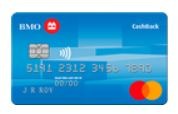
- Welcome Bonus: 5% cash back on your first $2,500 in purchases
- Annual Fee: $0
- Regular APR: 20.99%
The card has no annual fee and is the best credit card for students in Canada. Its competitive welcome offer, which includes 5% cashback on all purchases during the first three-month period, makes it stand out. It’s perfect for purchasing essentials like textbooks and technology at the beginning of a semester.
This card offers you the best cashback (3% for groceries and 2% for bills) and sends insights to help you stick to your budget. This card can give you $312 cash back annually based on Forbes Advisor’s calculations of average Canadian spending. Maximizing your welcome offer of $125 will earn $437 in the first year. You can redeem this amount at any time.
Pros:
- Competitive welcome offer of 5% cash back.
- 3% cash back on groceries (up to $500 per month).
- No annual fee.
- Flexible cash back redemption (you can redeem for any amount at any time).
- Extended warranty and purchase protection.
Cons:
- $500 per month limit on the 3% grocery category and the 1% recurring bill categories (you’ll then earn the base 0.5% cash back rate if you exceed the limit).
Earn up to $125 in cash back by receiving 5% cash back on purchases worth up to $2,500 made in the first three months. You can earn 3% cash back on groceries, up to a maximum of $500 monthly. You can earn 1% cash back on recurring bill payments, up to $500 monthly.
All other spending will earn you 0.5% cash back with no limit. There is no annual fee, and cashback can be redeemed for any amount. You can deposit cash back into your BMO chequing, savings or Investor Line account or use it as a statement credit. Additionally, you can access financial insights to track spending. The card also includes extended warranty insurance and purchase protection. APPLY NOW.
Best No Annual Fee Credit Card
American Express Green Card
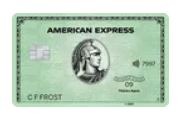
- Welcome Bonus: 10,000 Membership Rewards
- Annual Fee: $0
- Regular APR: 20.99%
At first glance, the earning rate and annual earnings for the Amex Green Card don’t look that impressive, but when you transfer the Membership Rewards you earn on every purchase to its large number of airline and other loyalty partners, this card starts to prove its worth. When you consider it’s a card with no annual fee, it’s clear that it’s all profit.
Pros:
- Earn 1 point per dollar on all purchases and an additional point on eligible hotel stays and car rentals booked through the Amex Travel portal.
- No annual fee.
- Extends manufacturer’s warranty by one year on all purchases
- Transfer Membership Rewards 1:1 to several airline and other loyalty programs.
Cons:
- Only includes two types of insurance.
- American Express isn’t widely accepted in Canada.
- The earn rate in popular spending categories is higher on other cards.
